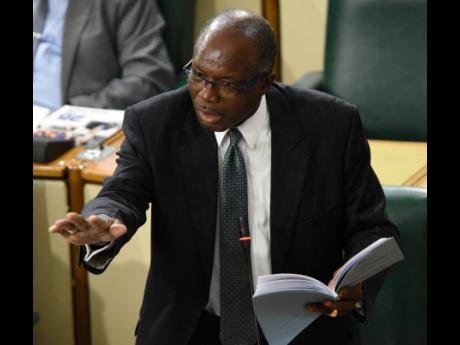Editorial | No to neutering of Integrity Commission
Anyone who is keen for integrity in public life and in ensuring that there is institutional restraint on impunity in grabbing the national silverware ought to pay attention to the parliamentary committee reviewing the Integrity Commission Act.
They must be prepared to man the intellectual ramparts around the commission, ready to ward off the circling hyenas, jackals, and the birds of carrion of Gordon House.
Believing that it may be sufficiently wounded and incapable of mounting a defence, they are preparing for a big takedown of the Integrity Commission (IC). This must not be allowed to happen.
Stalking the IC moved to direct assault at a meeting of the committee last week. Government Member of Parliament (MP) Everald Warmington – seeking to exploit a self-inflicted wound – unveiled an array of proposals that would effectively neuter the commission.
But while it was Mr Warmington – notorious for uncivil behaviour in the House and elsewhere – who snarled and bared his fangs, the attack was not his alone. Others, like Little Red Riding Hood’s wolf, may have disguised their growls and sharpened teeth, but the intentions were no less clear.
Since it was launched a year ago, the committee, until Wednesday, did little in advancing its mandate. Indeed, not much has been done or said with respect to the score of recommendations the Integrity Commission has submitted to the committee – and in five annual reports – for amendments to the IC Act and related legislation. They were not addressed last week.
BANNED
But if Mr Warmington were to achieve his ends, the Integrity Commission would be banned from investigating any matter that happened before the law’s passage in October 2017. That, effectively, would invoke a statute of limitation on pre-2017 corruption matters – at least with respect to the involvement of the IC. It would probably also mean that the commission would have to jettison legacy investigations inherited from the former Office of the Contractor General, whose role it subsumed.
Significantly, too, while the Integrity Commission has campaigned for greater transparency in how it conducts its work, Mr Warmington wants to remove privilege from reports by the commission, even after they are tabled in Parliament, which is required by law for its annual reports, special reports, and those on its investigations.
If this were to happen, it would remove from the five commissioners, the persons who author the documents, or anyone who publishes or broadcasts their findings, the immunity they now enjoy from being sued by people who claim to have been defamed in the reports.
Legislators enjoy this very cover for anything they do or say in Parliament. The protection extends to people outside of Parliament, including the press, which reports on their speeches and statements or from parliamentary documents.
The great paradox of Mr Warmington’s suggestion is that he would retain cover for any outrageous statement he makes in the House. He anchored the case for his two most egregious proposals in an argument that the Integrity Commission was a creature of Parliament, subject to its rules and regulations, including the Standing Orders. It was perhaps more than a Freudian slip that Mr Warmington actually referred to the IC as a “committee of Parliament” rather than an independent commission.
WEAKEN THE COMMISSION
First, in his bid to weaken the commission and place it directly under the thumbs of politicians (a group most likely to be subject to the commission’s scrutiny), Mr Warmington would abandon the post of director of prosecutions from the IC. His supposed grounds is that because the IC is a “committee” of Parliament, the effect of the prosecutor is of Parliament establishing “its own investigative arm which proceeds to investigate one category of persons”. That is contrary to the constitutional arrangements of the police investigating criminal conduct and the director of public prosecutions (DPP) prosecuting cases, Mr Warmington says.
But the MP said nothing of the common-law right of citizens to undertake prosecutions or the fact that the Integrity Commission Act makes it clear that the authority of the director of corruption is limited by the constitutional powers of the DPP, which includes the right to intervene in, or take over cases, or halt any prosecution in any court.
Moreover, when Bruce Golding, the former prime minister and leader of the governing Jamaica Labour Party, proposed that the IC have its own prosecutor, it was because there was consensus that the existing arrangement was not working well and that the crisis of corruption in Jamaica was so entrenched that it demanded special attention.
On the basis, too, of the commission’s role as a “parliamentary committee”, Mr Warmington wants to transfer to politicians the power to “impeach” the commissioners and their top staff. Currently, if commissioners are presumed to have misbehaved, they can be removed if a tribunal appointed by the governor general, after consultations with the prime minister and the leader of the Opposition, investigates the allegations and recommends that course of action.
Putting an impeachment process in the hands of MPs would probably mean a revolving door of commissioners and changes after every report with whose findings those in power disagree or whose handling leads to a quarrel – as with the recent case with Prime Minister Andrew Holness, which is now causing the buzzards to circle.

